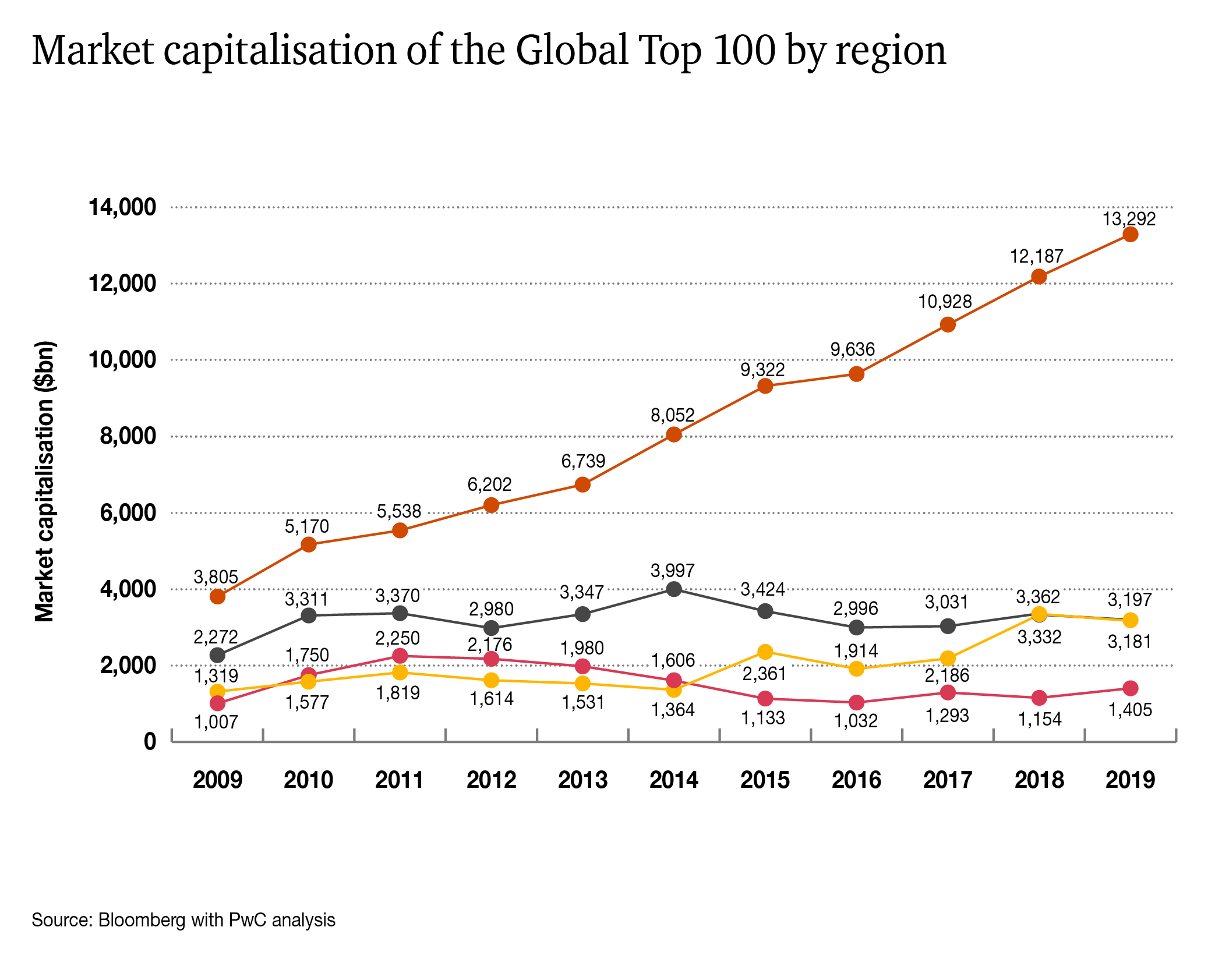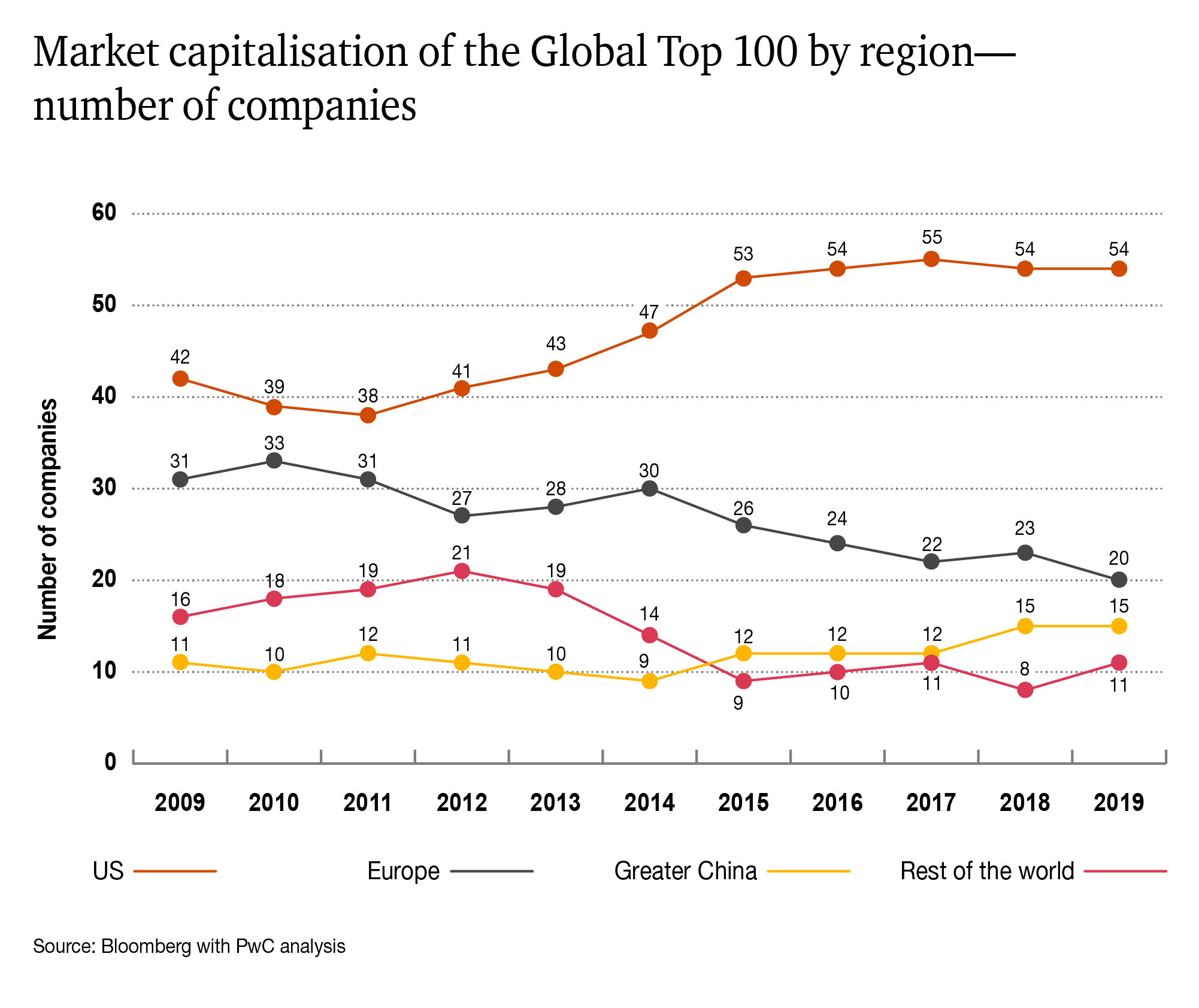{{item.title}}
{{item.text}}

{{item.text}}
Growth more subdued than in 2018.
US accounts for over half of companies in Global Top 100 and 63% of total market capitalisation.
Companies from China and Europe in the ranking lose value.
New additions in the Global Top 100 include companies from India and Saudi Arabia.
The technology sector continues to dominate; Microsoft overtakes Apple as the world’s most valuable public company.
Unicorns’ value grows 6% with nearly half of the top 100 based in the US.
London, UK, 12 August 2019 - The market capitalisation of the world’s 100 largest public companies has increased by $1,040bn (5%) in 12 months, according to PwC’s Global Top 100 ranking, released today.
The rise is more subdued than the 15% increase reported in 2018, reflecting more challenging market conditions.
Growth in market capitalisation in the past year has been primarily driven by US companies, on the back of a robust economic environment. Both China (-4%) and Europe (-5%) registered a decrease in market capitalisation, reversing last year’s gains.
The technology sector continues to dominate, although the healthcare, consumer services and telecommunications sectors performed most strongly over the past year.
For the fifth year running, the US accounts for more than half (54) of the Global Top 100 by number of companies with growth of 9%, outpacing the overall. US companies represent 63% of the total market capitalisation, up from 61% last year.
China is the second largest component of the Global Top 100 by market capitalisation, despite a 4% decline in the past 12 months following trade uncertainties and their impact on local market sentiment. This contrasts with the 57% increase in 2018, when three new companies entered the Global Top 100 and two rose to the top ten.
Geopolitical challenges including uncertainty on Brexit are likely to have impacted European based companies in the ranking in the past year. Three European based companies have left the Global Top 100 and overall European based companies in the ranking lost 5% in market capitalisation. Recent trends for companies from the Rest of the World are more positive, with market capitalisation increasing by 22%.
Overall, the best performing country in the ranking in relative terms was India. Despite only two companies in the Global Top 100, a strong domestic stock market performance and robust earnings increased their market capitalisation by $63bn or 37%.
Ross Hunter, Partner and IPO Centre Leader, PwC UK comments:
“While the US continues to be the powerhouse of the Global Top 100, we expect to see a growing contribution from China, India and other developing markets. The new entrants from India and Saudi Arabia this year, and strong growth in the value of companies from the rest of the world support this view.”
The technology sector continues to be the largest component of market capitalisation within the Global Top 100, ahead of the financials sector, with healthcare in third place. Growth in the healthcare, consumer services and telecommunications sectors of 15% outpaced technology’s growth (6%), which experienced volatility in late 2018. Financials was the weakest performing sector with a 3% decline in market capitalisation.
The global top ten continues to be dominated by the technology and e-commerce companies – Microsoft, Apple, Amazon, Alphabet – followed by Facebook in sixth position and Alibaba and Tencent as numbers seven and eight, respectively.
Microsoft was the strongest performer in terms of absolute increase in market capitalisation, gaining $202bn or 29% in value compared to 2018, which propelled it into the top spot. It’s followed by Apple, Amazon and Alphabet. This breakaway group is 40% ahead of the fifth ranked company, Berkshire Hathaway, which has a market capitalisation of $494bn.
In the private company domain, the value of the top 100 unicorns grew by 6% to $815bn at 31 March 2019, consistent with their public company counterparts. Nearly half (48%) of the top 100 unicorns were from the US, also in line with what we see in the Global Top 100.
Notably, China contributes approximately 30% of unicorns in both number and value terms, which is a much higher proportion than for the Global Top 100. As a significant source of future IPOs or acquisitions by other companies, this suggests that we can anticipate more entries from China into the Global Top 100 in due course.
Ross Hunter, Partner and IPO Centre Leader, PwC UK:
“While the technology sector did not perform as strongly as in previous years, it continues to dominate the Global Top 100, with the top four US giants in a league of their own. Longer term, we anticipate the imbalance reducing, with China technology companies, in particular, challenging the current position. The prominence of companies from China amongst the unicorns may be evidence to support this.”
View the PwC Global Top 100 here.
Notes to editors:
About PwC
At PwC, our purpose is to build trust in society and solve important problems. We’re a network of firms in 152 countries with over 327,000 people who are committed to delivering quality in assurance, advisory and tax services. Find out more and tell us what matters to you by visiting us at www.pwc.com.
PwC refers to the PwC network and/or one or more of its member firms, each of which is a separate legal entity. Please see www.pwc.com/structure for further details.
© 2019 PwC. All rights reserved
{{item.text}}

{{item.text}}

